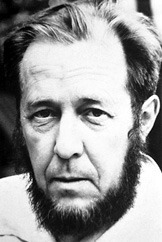R. Jean Mathieu's Blog, page 8
June 20, 2014
Grand Adventure
I was a highwayman, along the coach roads I did ride
With sword and pistol by my side
Many a maiden lost her baubles to my trade
Many a soldier shed his lifesblood on my blade
The bastards hung me in the spring of ‘25
But I am still alive…
Tomorrow, I have a business negotiation to attend to, a meeting with my accountant, a radio interview, and a date. In between, I need to write that paper due Sunday, drop off my computer to finally get fixed, and drop off my paperwork with the Peace Corps so we can process my application, at long last.
Saturday, I see the Mikado with one young lady and hike the Marina Trail with another. I suspect the paper still won’t be done, so there’s that to do. Sunday, I have Quaker meeting and prepare for my trip to Portland, and that paper’s due. Monday, I head north with my friend Brandi Bennett for a combination business meeting and write-a-thon on the glorious Coastal Starlight line.
Did I mention the paper is about my company, FedoraArts Press, as we press into Brazil, one of the five largest ebook markets in the world?
Tonight, I just got in from Sacramento. I’m tired, and I’m also afraid.
I’m afraid of what I’ve set for myself. Of three dates and a radio interview and business and bull sessions. But as I sat with the fear, and looked at it in the firelight, I think I know what it was. I felt this the night before I flew to China. I felt this the night before I went up to the mountain for ten days of meditation. I felt this the night before I boarded the Lady Washington.
I’m having an adventure, and I’m afraid I won’t measure up.
I’ve failed before. Hell, I’ve failed more than a lot of people twice my age. I failed at Learning to Think, I failed at One Weird Idea, I failed at my first attempt at a degree. I still miss karate. And I’m not going to claim I know how to get over failure, or being afraid of it.
But it’s worth getting over.
This is night-before jitters. It means I’m doing something that scares me. Something I don’t know if I’ll accomplish. But if I fail again, it’s not going to be from lack of ambition and it’s not going to be from lack of effort. China exiled me three times, I came back four. I came into Northeastern University with a 1.666 GPA, I graduated with honors.
This means I’m doing something worthwhile.
And that makes the game worth the candle. I want to be scared of what I set out to do. I want to be worried I won’t be able to accomplish it.
If I only did what I knew I could do, what’s the damn point?


April 21, 2014
No Time Released!
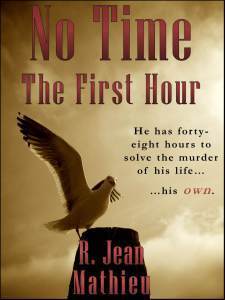
No Time: The First Hour
My first novel, No Time, is now available from Smashwords! That’s right, my 60,000-word NaNoWriMo winner is cleaned up and ready to read! Gabriel “Gooch” Caballero, time-travelling detective, finds out on Good Friday that he’s dead by Easter Sunday. Now, he has to find out who kills him, and how to get out of it. It’s “like Harry Dresden if Dresden wanted to be Don Quixote instead of a noir detective.” Updates forthcoming when it goes up on other markets.


March 31, 2014
On Easter Sunday…
On Easter Sunday, my novel No Time: The First Hour comes out on Amazon, Smashwords, Kobo, Nook, et al. It’s the story of Gabriel “Gooch” Caballero-Gutierrez, a man who has 48 hours to solve his own murder. I don’t know about you, but I am really excited about this. :D


February 1, 2014
Your Ideas Intrigue Me…
My Story Won an Award!
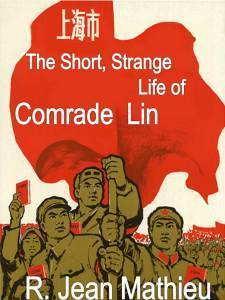 I just found out my short story, “The Short, Strange Life of Comrade Lin,” has won Second Prize in the 2013 National Fantasy Fan Federation Short Story Contest! The judges particularly praised its “descriptive power” and the sympathetic portrayal of Lin, even as a hardcore Maoist.
I just found out my short story, “The Short, Strange Life of Comrade Lin,” has won Second Prize in the 2013 National Fantasy Fan Federation Short Story Contest! The judges particularly praised its “descriptive power” and the sympathetic portrayal of Lin, even as a hardcore Maoist.
I am certainly very proud, and will have this story up for sale at all the usual locations in the next week.


January 5, 2014
Quake, from Malleable Dance
Erin Malley is a dance instructor, dancer, and incredibly hilarious human being. She’s running a Kickstarter campaign to film her eerie and moving dance piece, Quake. She’s only $900 short of her goal and, as of this moment, she has 13 hours to go.
Here’s her appeal in her own words.
All the jokes about modern dance die beneath Erin’s feet. Quake is …something else. Something you feel tugging on your ribs. If you, like me, always donate to buskers on the street on the principle that artists should be supported and the arts are good, please donate.


New Year’s Resolutions
The most generic picture I could find!
It’s a weird time to be in China right now. The Western New Year has come; the Chinese New Year is yet to come. This year, it’s only one month, since Chinese New Year is on January 31. It still gives a man plenty of time to think.
Like everyone else, I make New Year’s Resolutions and like everyone else, I break a lot of them. In 2013, I achieved two of my resolutions: I wrote more than 100,000 words total (almost 150k!), and I scored more than 50 on my DELF. I had six resolutions all together, and I know one third is a damn sight better than most people manage.
In 2014, I feel lucky. I’m setting seven this year, across all fields of endeavor. I’m announcing them here and now to burn my boats behind me and prevent any attempt at retreat.
#1. Graduate.
I want to graduate cum laude from Northeastern University this May and wrap up my studies in June.
Camera’s back here, buddy.
I’ve been doing this online schooling gig for four years now, through expulsions, continental shifts, job losses, five moves, and, oh yeah, living in China for most of the time. Graduation is so close I can taste it.
Stretch goal – Graduate magna cum laude.
#2. Write 200,000 words
I want to lay down 4,000 words a week throughout 2014.
Production is the only way I’m going to have more to sell. I managed to write two novels last year, I could probably manage four this year, or two and a bunch of short stories, or three and some short stories. I have options.
Stretch goal – 250,000 words. The Quarter Million, baby!
#3. Flirt in Cantonese
By June 1, 2014, I want to be able to carry on a conversation in Cantonese in one or two subjects that I know.

I couldn’t find any free-range pictures of cute Chinese girls. I know, I know. I’m sad too.
I can hear the bitching now: Why not Mandarin? Or Spanish? Some sensible language? I’ll tell you. I’ve been studying Mandarin for four years, banging my head against a wall for the last three. I can get a taxi, buy vegetables, and order a water bottle or a pizza, but anything much more involved than that and I’m sunk. That’s after four years, and people still mistake my Mandarin for English. On the other hand, I enjoy speaking Cantonese, enjoy listening to Cantonese, and am actually passably good at it. I have a very limited vocabulary, but that’s a solvable problem. I’ve found a Cantonese teacher that I plan to meet twice a week, and as I live in Canton, I intend to go out and practice.
Stretch goal – none on this one.
#4. Earn $1,500 in sales
I want to earn $1,500 total in book and story sales across all channels by December 31.
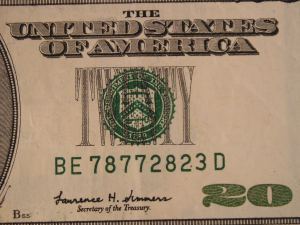
The moolah!
I’m already part of the way here, I sold copies of all my extant stories on the 2nd. I ran the numbers, and realized with what I have, what’s going up, and what I’m planning to write and put on sale this year, using industry averages and the necessary equations, I could make $6,000. So I cut that number in half, because I dated Torie Gervais for two years and she taught me to actually be skeptical about money. Then I cut it in half again, because life is crazy. Given the upticks in positive comments, sales, and visitors to this blog since the 1st, and the fact that my marketing’s barely started, I am cautiously optimistic that I can sell $1,500 worth of fiction by December 31.
Stretch goal – $3,000.
#5. Live well.
I want to sleep from 1-10AM unless I have something to do, cook decent meals twice a week, get a massage once a week, stretch and do breath counting every morning, and shower every night before bed. I want these to be my habitual practices by April 1.

I wanted a picture of nyotamori, but they were all behind paywalls.
This is a grab-bag resolution of treating myself well. Making these my everyday habits and practices will go a long way to solving certain chronic issues in my life, such as the love-hate relationship with sleep and the way my diet goes out the window when I’m feeling down. These are also essential foundations for my mental and physical health, which should help with the other resolutions somewhat.
Stretch goal – massage twice a week, cook thrice a week.
#6. Sit.
When I am in Quaker country on a given Sunday, I will locate the closest Meeting and attend. If not, I will sit in the Discipline of Solitude myself on Sunday morning.

A Quaker meeting-hall on Wikipedia.
I think this, more than anything, will deepen my relationship with the Divine. The capacity to sit in quietness, and learn to discern the leading of God. As much as having a Meeting close by helps, if I need to go alone, I need to go alone.
Stretch goal – Also practice one of the other Disciplines ((fasting, study, simplicity, meditation, submission, service, or prayer) from Richard Foster’s Celebration of Discipline.
#7. Earn my Black Belt.
I want to resume my karate practice and qualify for my black belt.

We wear white cotton gi, rather than blue, but this picture was cooler.
This is the big one. This is the one makes my heart go pitter-patter. I can’t jump back in, so I’m staging it: I want to do the daily dozen OR karate OR tai chi twice a week by February 1, thrice a week by April 1, and daily by June 1.
Stretch goal – Test for my black belt.


January 2, 2014
Fuck You, I Studied Social Sciences
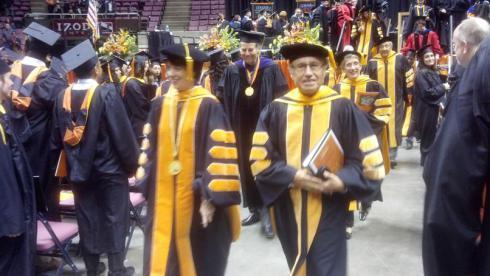
According to the narrative, I am a waste of money.
According to the narrative, I will not get a job. And probably don’t deserve one.
I chose the wrong major, you see.
I am majoring in sociology, with a minor in business administration. You may notice that this is not engineering, computer science, nursing, applied mathematics, or finance
whoops, finance is no longer a smart major either. Some of you are already dusting off your hilarious “do you want fries with that?” and “underwater basketweaver” jokes, backed up as you are by admirable men like Randall Munroe and Richard Feynman. Most of you are honestly wondering what a “Sociologist” does, and boggling at the clear violation of hard-headed, realistic “common sense” that a social science major is. After all, “anthropology” and “sociology” (assuming they aren’t lumped together) make the top five worthless/least profitable/worst majors lists with depressing regularity. And if you’re not in college to make more money, what are you doing there?
We have this idea in America that there is A Job, and you choose A Major that sounds like A Job that you want. So finance majors become financiers, engineering majors become engineers, computer science majors become programmers. Under this model, any major that does not sound like A Job you can picture is, by definition, a bad major. After all, what’s an ‘Englisher’? Do they write or something? How many historians can there possibly be? Do drama majors become dramatists? What do liberal artists do all day, study liberals? The lack of a clear career direction, in the popular narrative, is the death knell for a major or field of study.
Let me tell you something: Not all computer science majors become programmers, and this does not make them failures. Not all art majors become professional painters, not all political science majors become politicians. Somehow, they make do. Perhaps the art major does commercial design instead, creating menus, signs, and websites that are readable and less offensive to the eye than one of my covers. The political science major starts selling insurance, her awareness and training allowing her to keep one step ahead of the seismic changes of Obamacare. The computer science major becomes a technical writer, and the worst humiliation they have to suffer is working alongside an English major on the job. They aren’t in A Job that their majors seem to lead to, but they apply what they learn to the jobs they find.
Which means that, for example, knowing how to assess the authenticity and value of text documents to the matter at hand (History) or how to compose a report, an analysis, or a manual in a lucid manner (English) or even how to describe and predict large groups of people (Sociology) could conceivably be useful on the job…even if the job doesn’t have a title like historian, sociologist, or English-er.
In sociology, I have learned how to do statistical analysis, how to find and use census and market data, how to avoid confirmation bias and correlation-causation errors, how to conduct interviews and surveys, and some of the known facts about how humans act in large groups. From other classes, because I am one of these heathens that uses the electives to broaden his knowledge rather than sneering at the system as a waste of time, I have learned to write grants and how the RFP and grant systems work, how to use geographic information system software and what the data can be used for, how to draft a contract, how to assemble an accounting system and understand what it tells me, how to conduct a marketing campaign, and how to construct an argument in formal logic. Over the course of my classes I’ve analyzed and defended opinions on such diverse topics as China’s ascendance and presumed hegemony (it won’t happen), the ebook market (it looks like my mother), and business ethics (not necessarily an oxymoron).
In short, I’ve learned how to describe and predict what people in groups will do. Anything involving large groups of people (such as voters, customers, clients, aid recipients…) is something I can make a critical difference in, for the benefit of the organization employing me. To this, I’ve added the ability to understand the different functions of a business, from product development to employee relations. Marketing consultants are hired (and paid well) to understand the customer base, using interviews, surveys, and statistical analysis, and then translate it into something the company can act on. They’re just not called ‘sociologists’ when they do it, though the techniques are nearly identical. Government programs and nonprofits employ whole swaths of people to ensure that they’re reaching the populations that the programs are intended for. These are called public relations people or outreach directors, not sociologists. As a business owner myself, I am very interested in who is buying my product and why.
And that’s not even getting into the leaps and bounds going on within the field, like this analysis that predicted the intensity and location of violence in Afghanistan, or Nate Silver’s election metrics, or the work of applied anthropologists everywhere. We are starting to understand what we do and why when we interact with other people in ways we never have before.
It’s been said that everything you learn in a technical major is outdated within five years. How quickly do you imagine businesses, governments, and NGOs are going to lose interest in studying, understanding, and communicating with their respective target populations?
So, go ahead. Tell me my major is worthless. Tell me it’s a waste of money and I should have studied something sensible, something that chases a job market bubble, like nursing or petroleum engineering. Tell all your absolutely hilarious soft science jokes.
Go ahead and try.


December 30, 2013
Reader Survey!
Hokay!
Bit of an odd thing to bring a blog back to life with but, what the hell, it needs doing. I’ve been putting up my work for sale at Smashwords, Amazon, the Nook, and on Kobo. You can also pick them up wherever better ebooks are sold. They even have covers!

Buddhist beatnik vampires of 1955 San Francisco.
Pretty snazzy, no? Go and take a look at the others. Even download a sample to page through.
And if you have read some of them, or want to…would you take two minutes to fill out a little survey?


February 23, 2012
Aleksendr Solzhenitsyn and the Decline of the West
The following link is a speech given by the Soviet émigré and author, Alexander Solzhenitsyn, a man I respect both for his great character and the power of his words.
Go ahead and read the whole thing, it’s quite interesting. Solzhenitsyn’s basic message is that the modern world (which in his time included both the USSR and the Western world, and the first hints of a “Third World” out there) is utterly lacking in spiritual fibre. He discusses the commercial and legal forces of mediocrity in the West, and the lawlessness of the USSR. Solzhenitsyn hammers home the Christian (and specifically Orthodox) message, and hard.
This, to me, was the most moving passage.
“If, as claimed by humanism, man were born only to be happy, he would not be born to die. Since his body is doomed to death, his task on earth evidently must be more spiritual: not a total engrossment in everyday life, not the search for the best ways to obtain material goods and then their carefree consumption. It has to be the fulfillment of a permanent, earnest duty so that one’s life journey may become above all an experience of moral growth: to leave life a better human being than one started it.”
He follows that up with “Is it true that man is above everything? Is there no Superior Spirit above him? Is it right that man’s life and society’s activities should be ruled by material expansion above all? Is it permissible to promote such expansion to the detriment of our integral spiritual life?”
To Solzhenitsyn, the answer lies in a re-Christianization of the West, a rededication to the “moral heritage of Christian centuries with their great reserves of mercy and sacrifice.” But, as I was reading the article, I was making equal allegories in my own mind. His critiques of the Western sickness are accurate, just as much and perhaps more so now than when he wrote it, but his prescription doesn’t seem to match the sickness. But one could make an equal argument for a re-Romanization of the West, a return to the idea of civic virtue, “civis Romanus sum” and all. Or even a reconsecration of the very values that the Western sicknesses spring from: the values of the Renaissance and the Enlightenment.
There’s also the tired counterargument to the Christianization of anything, the inherent dangers of Christian morality. I won’t bother repeating them here, this is the Internet, go to YouTube and look up the first dozen or so. Solzhenitsyn’s only comment are a few fleeting references to the physical side of man being “cursed” in the Middle Ages.
And yet, I keep coming back to that passage. There must be something to life other than the acquisition and consumption of material things. Even Charlie Stross seems to think so, although I don’t know about Eliezer Yudkosky. Solzhenitsyn also shows his Soviet heritage there, since a cornerstone of Marxist doctrine is that “liberty” is personal fulfillment, not purchasing power. Elsewhere, he touches on how eerily silent the Western world was, at that time, on personal and spiritual fulfillment. Since the 1960s, I would argue that such concerns have largely been incorporated into the superficial information glut that Solzhenitsyn decries elsewhere in the article.
“Leaving life a better human being than one started it,” is as basic and as concise a description of the non-material, spiritual drive that I can find. Stripped of Solzhenitsyn’s orthodoxy (and Orthodoxy), that is the aim, and one that I believe theist or atheist, humanist or Humanist, could get behind. One must, of course, start defining “better” (and work on defining “human being”), but a basis is there. Solzhenitsyn seems to believe that self-restraint, and a sense of duty, are key elements of becoming a better person. I can’t disagree.
Which brings us to the core of the passage, Solzhenitsyn’s Marxist and Christian assertion that “[life] has to be the fulfillment of a permanent, earnest duty.” Solzhenitsyn’s whole speech is a critique against freedom outstripping duty in the modern Western world. He rails against the letter-of-the-law nature of Western society, with the sense of a higher duty simmering under the surface. He speaks of the side effects of modern plenty as a timidity to sacrifice; duty hides there, too. During the Roman republic, and the merchant republics of the Renaissance and even into the early revival of republicanism (small-R) by America and by France, civic duty was seen as the companion and balance of civil liberty.
While I do not agree with Solzhenitsyn that the Orthodox Christian God should be the object of this duty, that duty is necessary to make our lives fuller and richer, and our nations, and the world, I can’t find myself contravening. The questions that Solzhenitsyn never asked, but that we must, are “duty to whom?” and “duty to what?”
But, in laying the foundations for such questions, and in establishing duty as a cornerstone of a new approach, Solzhenitsyn is, truly, the man who arranges the blocks.










